Thousands mark Gezi Park protests on seventh anniversary
Thousands of Twitter users have marked the seventh anniversary of Gezi Park protests on May 31 via sharing pictures and quotes from the landmark demonstrations, while also commemorating those killed by police. Initially centered in Istanbul, the protests spread to all over Turkey starting from June 1, as millions took to the streets to raise their voices against police brutality and government policies. It turned into the largest wave of protests against the government in Turkey's history.
Duvar English
Thousands of Twitter users have marked the seventh anniversary of Gezi Park protests on May 31 via sharing pictures and quotes from the landmark demonstrations, while also commemorating those killed by police.
The protests initially began as a reaction to renovation plans of the ruling Justice and Development Party (AKP), which aimed to construct a mall or artillery barracks on the city's few remaining green spots.
A small group of environmentalists from Taksim Solidarity gathered in the park and refused to leave to prevent the cutting down of trees on May 27, 2013 after construction efforts began overnight.
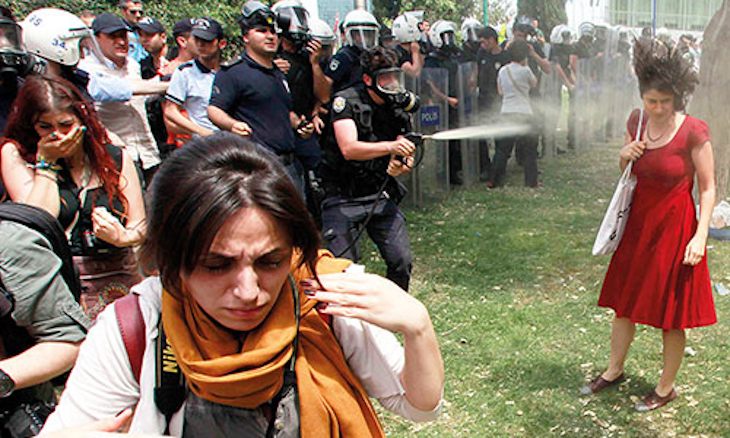
The group became larger on May 28 as politicians also visited the protesters to halt demolition in the area. Tents were set up to block any construction efforts that might take place at night, which were burned and removed by police.
Sırrı Süreyya Önder, then-deputy from the Kurdish-issue focused Peace and Democracy Party (BDP) was the first politician to support the protesters on scene. He repeatedly confronted police and construction equipment.
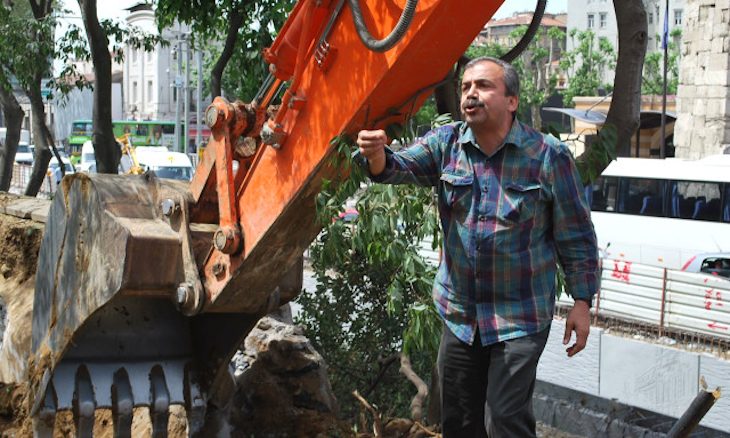
As the group became larger in reaction to police brutality, then-Prime Minister Recep Tayyip Erdoğan refused to backtrack from the construction plans.
"Whatever they do, we have made up our minds and will do it," he said in the kick-off ceremony for the third bridge construction.
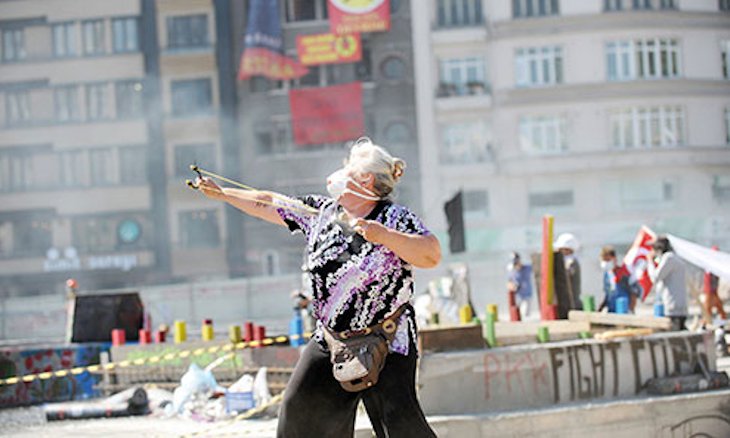
The day that changed the course of events was May 31, when the number of those wounded rose dramatically. Önder was wounded on his shoulder with a gas canister and main opposition Republican People's Party (CHP) deputy Sezgin Tanrıkulu fainted as a result of tear gas.
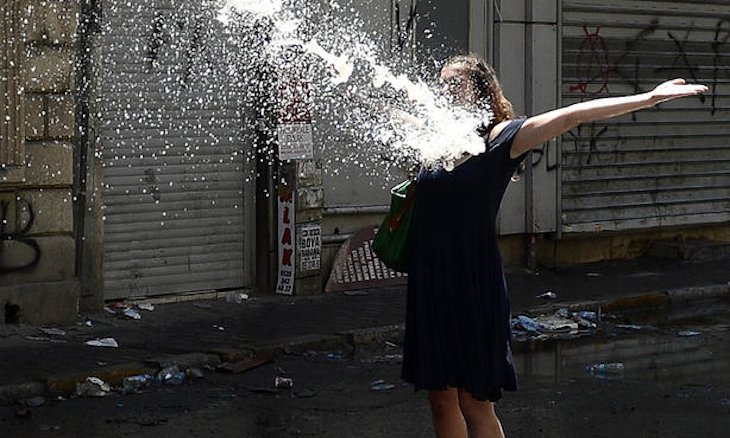
As the number of those wounded increased due to police brutality, the scenes were shown in all TV channels and social media, prompting thousands to head to the area to protest.
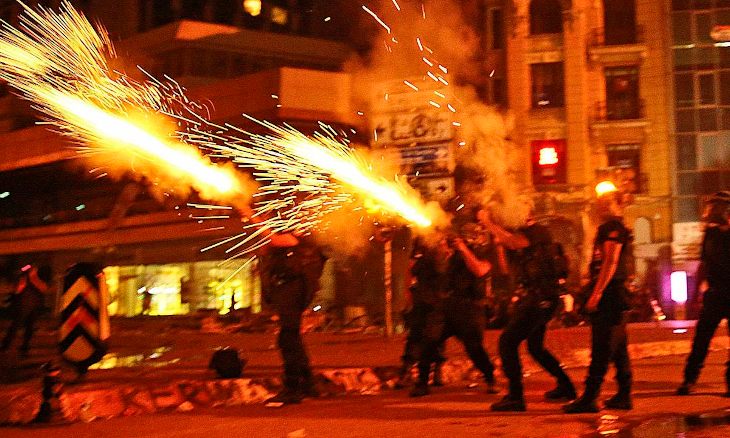
Police sealed off the park on May 31, as hundreds of thousands of people tried to enter it by gathering at all the ways leading to it. Unforeseen crowds were on the streets, as thousands also marched from the Asian Side to the European via crossing the bridge on foot to attend the protests.
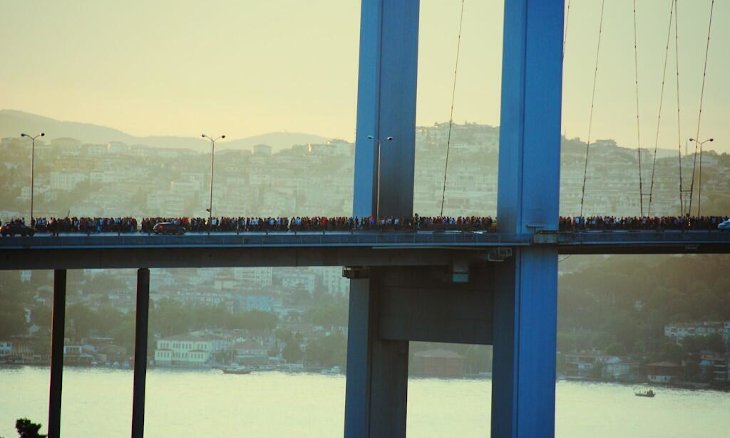
On June 1 afternoon, protesters managed to enter the park and CHP leader Kemal Kılıçdaroğlu canceled his rally in Kadıköy to instead head to Taksim to show support.
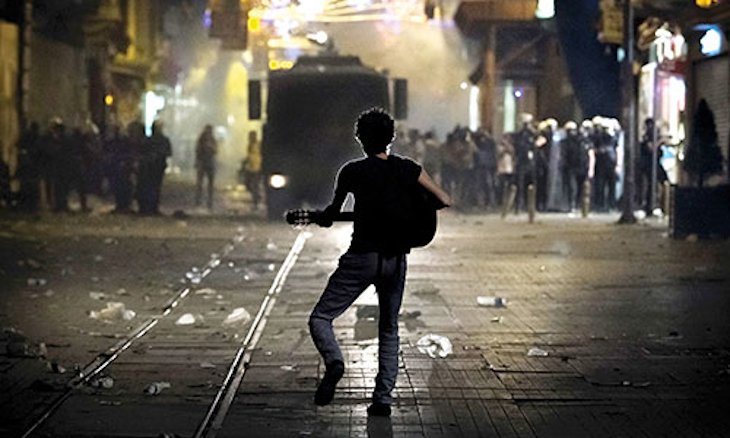
Initially centered in Istanbul, the protests spread to all over Turkey starting from June 1, as millions took to the streets to raise their voices against police brutality and government policies. It turned into the largest wave of protests against the government in Turkey's history.
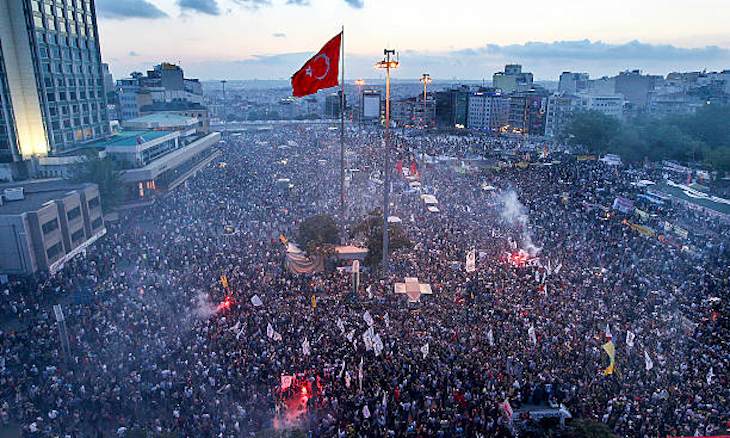
Social media was also critical for protesters to communicate on police presence and the most recent developments, since scenes of police brutality were not shown on TV.
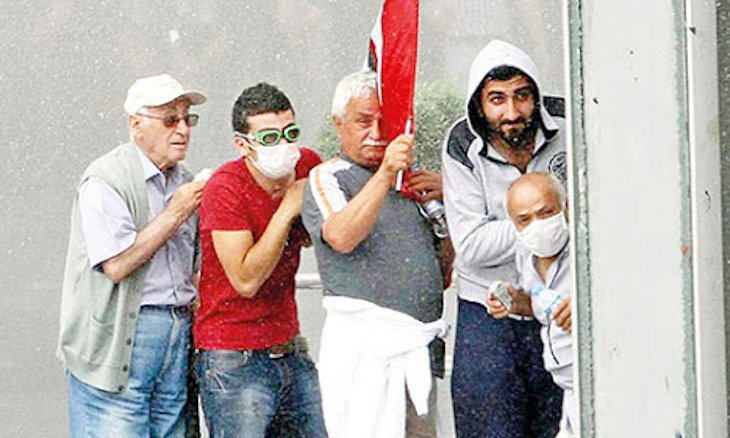
The days that followed saw colorful scenes, as creative slogans and banners filled the city. The demonstrators also showed novel methods of resistance, with one example being performance Erdem Gündüz's protest by standing at the center of Taksim Square in silence without moving for eight hours. Thousands joined him later on.
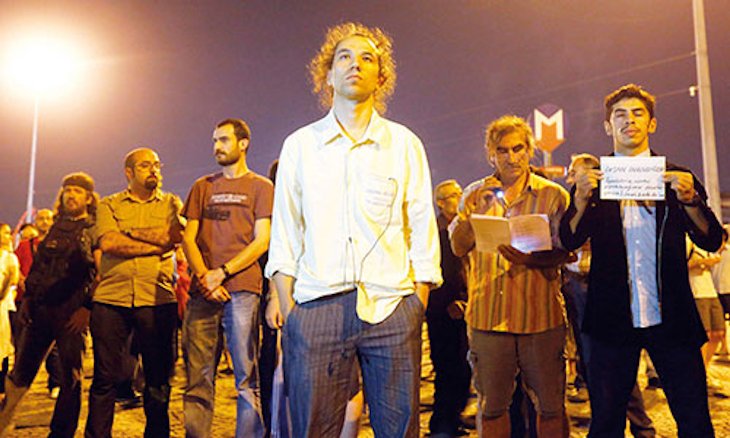
One of the striking characteristics of Gezi protests was it being all-inclusive. People from a wide range of political beliefs stood hand in hand to counter police brutality.
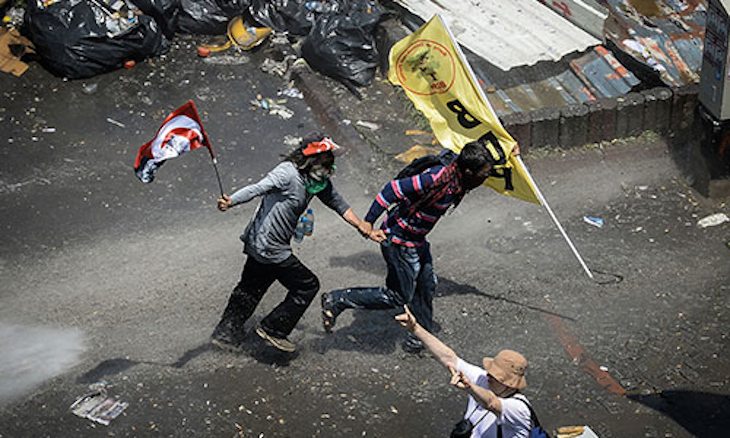
All the while, Erdoğan continued praising police and gave defiant speeches on the government's insistence on demolishing the park. He even once said that he's having difficulty in keeping his supporters at home who are willing to counter Gezi protesters.
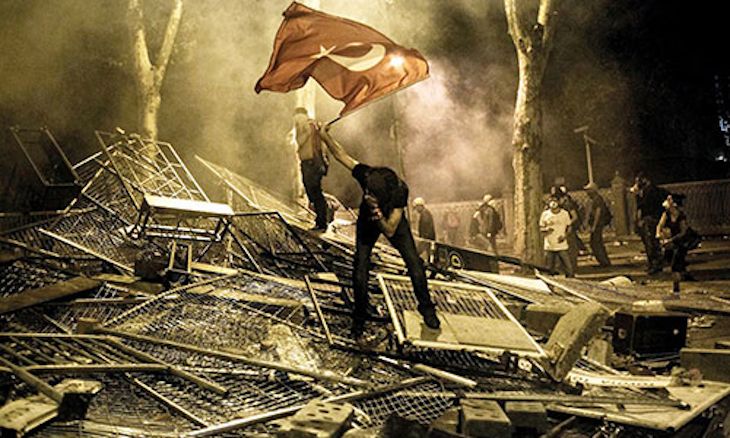
Despite claims of the AKP and the pro-government media on protests turning violent, demonstrators in the area refrained from any attacks on police. They even offered food, flowers and read books to them.
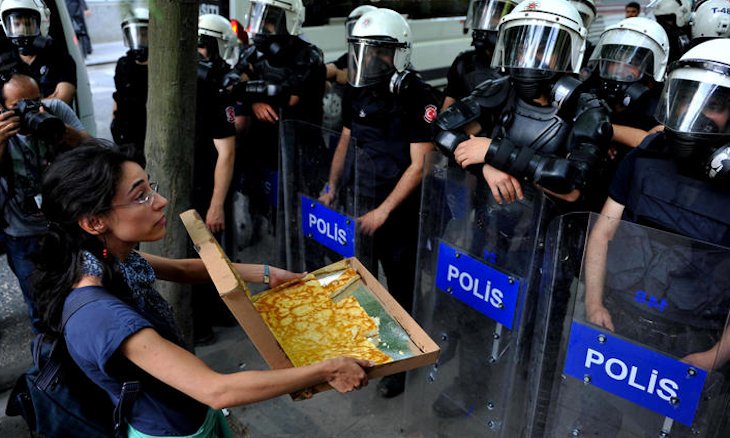
The use of tear gas, plastic bullets and water cannon was excessive throughout the protests. Thousands were detained at the time.
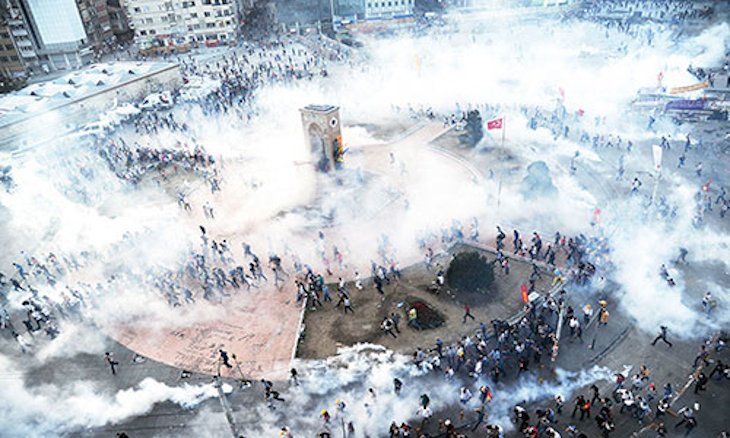
Eight protesters and police officer Mustafa Sarı were killed during the demonstrations. Sarı died as a result of an accident.
One of them was 14-year-old Berkin Elvan, who became a symbol of the protests after he was shot by a tear gas canister fired by police. He died in March 2014 after 269 days in a coma.
Another was Ali İsmail Korkmaz, who was beaten to death on June 2 by a group of officers and civilians in Eskişehir during the protests. He died on July 10, 2013, after spending 38 days in a coma.
Ethem Sarısülük was shot by police officer Ahmet Şahbaz in Ankara. He died after being hospitalized for more than two weeks, becoming the third protester to be killed during the Gezi Park protests after Mehmet Ayvalıtaş and Abdullah Cömert.
The others were Medeni Yıldırım, Ahmet Atakan and Hasan Ferit Gedik.
#Gezi7yaşında
— Taksim Dayanışması (@taksimdayanisma) May 31, 2020
Gezi Mehmet Ayvalıtaş, Ethem Sarısülük, Ali İsmail Korkmaz, Medeni Yıldırım, Abdullah Cömert, Ahmet Atakan, Hasan Ferit Gedik ve Berkin Elvan’dır!
Gezi acılar ve umutla birbirimize sarılarak kurdurduğumuz ailemizdir...#GeziDayanışmadır pic.twitter.com/mkNU4Dxedd
Hundreds of people lost their eyes as a result of gas canisters and rubber bullets, while the number of those who died as a result of excessive tear gas inhalation remains unknown. Few sentences were handed to police officers.
Although seven years have passed since the protests, the government and President Erdoğan continue to demonize it as an event that was a tool of foreign powers seeking to cause unrest in Turkey. They also deem the protests as a coup attempt that caused harm to Turkish economy.
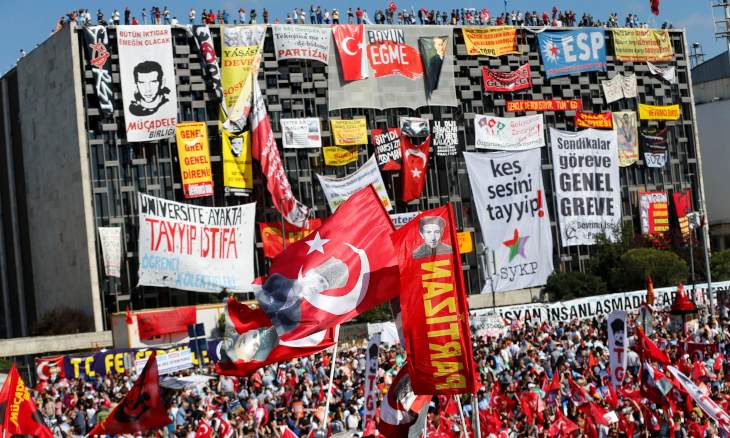
A total of 16 people were tried in the case into the Gezi Park protests. Osman Kavala, who was accused of being one of the “managers and organizers” of the protests, was arrested in November 2017 on suspicion of attempting to overthrow the government and the constitutional order through force and violence.
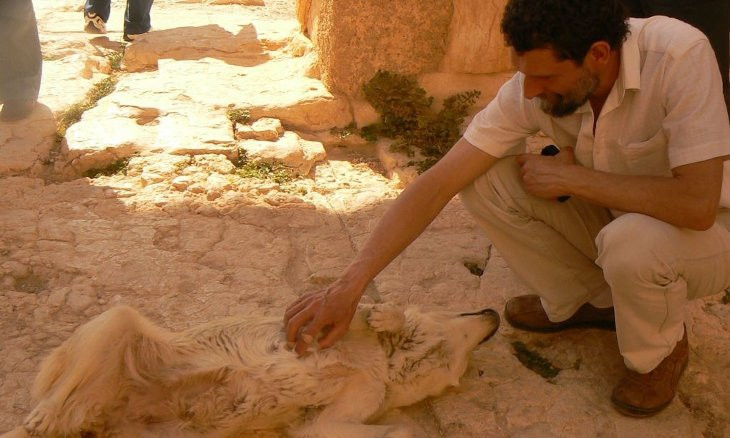 Thank you Osman, thank you life, friends say in letter to Kavala
Thank you Osman, thank you life, friends say in letter to KavalaKavala and eight other defendants were on Feb. 18 acquitted by a court outside Istanbul in the Gezi Park trial. He remains in prison on separate charges.
Due to the coronavirus (COVID-19) outbreak, no commemorations will be held on the streets this year as opposed to previous years.
Taksim Solidarity is making a broadcast to mark the day.
#Gezi7Yaşında canlı yayını 18.00'de başlıyor ?
— Taksim Dayanışması (@taksimdayanisma) May 31, 2020
21.00'de türkülerimizle, tencere tavalarımızla balkonlarda pencerelerdeyiz! ?
▶️YouTube canlı yayını: https://t.co/gHlFv7iBaP
▶️Instagram yayınları https://t.co/NQXbpuaIw3#GeziDayanışmadır ?️? pic.twitter.com/1RCUbmTEYq
